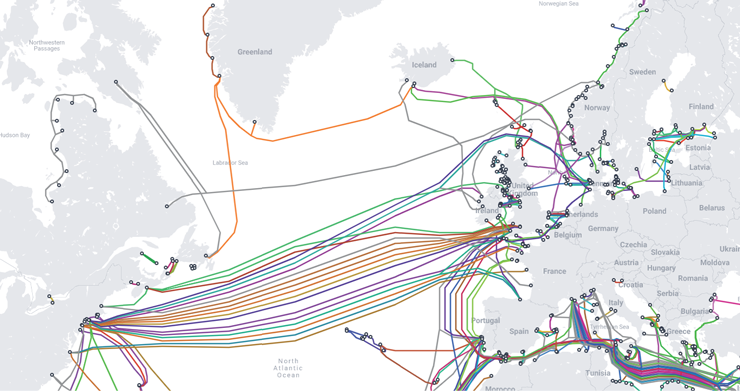

The report was prescient in that it highlighted the vulnerability of the UK as a result of its dependency on maritime trade. The need to protect our ports, shipping routes and subsea infrastructure so as to preserve, not just access to goods, but information that supports the UK economy has never been more important. The wider implications in the report were also recognised as the protection of the UK’s critical infrastructure also extends beyond the UK’s Territorial Sea and Exclusive Economic Zone to the Overseas Territories and Crown Dependencies.
The UK’s dependency on maritime trade and the importance of the infrastructure around our coastline is significant. By way of example: 95% of all goods by weight were imported by sea in 2020, 70% of all container moves are handled by 10 UK Ports, 99% of the UK’s global telecoms traffic is transmitted via subsea fibre optic cables and offshore wind produced 27% more electricity in 2020 than the previous year.
The alleged sabotage and attacks on the NordStream pipelines in the Baltic have highlighted the importance of the UK’s and many other nation state’s critical infrastructure. It also reminds us of the levels that some actors may go to in order to place pressure on stakeholders in the pursuit of political goals. This in turn raises a number of legal issues that will no doubt be played out in the international arena. These will become increasingly pertinent as competition between states for limited resources, disputes over maritime boundaries and greater emphasis on the use of hard (military or economic threat) and soft (negotiation or influence) power become more common.
Such is the threat in the UK that the Royal Navy has committed one of its frigates, the ‘SOMERSET’ to join Norwegian forces in Stavanger. This will become part of a Joint Expeditionary Force made up of the UK, Denmark, Estonia, Finland, Iceland, Latvia, Lithuania, The Netherlands, Norway and Sweden, which is planning to deploy a multi-national force in the North Atlantic. The consortium will ensure that there is co-operation between participating states to secure critical marine infrastructure. As a mature oil and gas basin, the North Sea has thousands of kilometres of underwater pipelines. Some of these include the following major supply arteries – with a total length of four times the NordStream II pipeline:
Perhaps of a greater economic concern is that of the extent to which the UK is ‘connected’ by fibre optic cables. The UK has approximately 60 cables in varying length which allow data to be transmitted easily within the UK and to the rest of the world. These cables vary in length from the 80-kilometres CeltixConnect cable connecting Ireland to the Tata TGN-Atlantic cable which connects Somerset, UK to New Jersey, USA and is 8,000 miles long. The global network is over half a million miles in length and comprises of over 200 independent cables. This carries over 95% of global communications amounting to some US$10trn in financial transfers via the SWIFT system which manages global bank transactions.

Map reprinted with kind permission of TeleGeograpy: www.submarinecablemap.com
Facing this increased threat, the Royal Navy has commissioned two specialist multi-role ocean survey vessels to patrol and protect underwater infrastructure using sensors and Autonomous Underwater Vehicles (AUVs). Depending on how matters develop in Europe however, this may not be enough.
Is there anything that the private sector can do to assist? Potentially, yes. With large numbers of Maritime Autonomous Surface Ships (MASS) and AUVs coming onto the market, there is clearly a technological capability for the commercial sector to mount a response. This, however, raises a number of other complex legal issues regulating MASS and AUV’s (some of which we have already discussed in our regular bulletins on autonomous vessels: Autonomous Ships: Mass for the Masses and Autonomous Ships: known knowns and known unknowns. Other legal issues that may arise are as follows:
Sources:
https://www.submarinecablemap.com/
https://www.theweek.co.uk/news/technology/955812/undersea-cables-connect-world-subject-concern
https://www.files.ethz.ch/isn/128690/pub1059-1.pdf
Our Admiralty and Crisis Management Team is the largest specialist marine casualty practice in the world advising on the full range of legal issues that arise from marine and offshore emergencies such as collisions, groundings, pollution, fire and explosions, salvage, towage, wreck removal, environmental and regulatory challenges as well as maritime security and piracy and hostile environments.
Complex Environments – We are widely regarded as the leading law firm globally that provides legal advice and support in response to incidents in complex and hostile environments. We handle major incidents and disputes for underwriters and their assureds in hostile and complex environments globally. This includes matters arising from casualties, war, terrorism, political risks, kidnappings, hijackings, extortions, drug seizures, unlawful detention of people and property, and other challenging events.
Offshore – Our detailed knowledge and global reach ensures that we are pre-eminent in the provision of full-service legal support to the Offshore industry. The offshore team has expertise on every stage of the offshore lifecycle including exploration, drilling, construction, production, storage and transportation. We act in disputes relating to all aspects of offshore contracts and contracts for the supply of marine and other support vessels, diving services for pipe installation and associated subsea work.
Maritime Boundary Issues – We advise private clients in respect of maritime boundary delimitation, including oil majors and seismic survey companies in respect of contested maritime areas. We assist in their due diligence as to the nature and extent of any boundary dispute between States, to ensure that our clients are contracting with the correct entity. We also advise on any risks associated should our clients have concluded an agreement with the incorrect State. Our team are familiar with sovereign rights and powers under UNCLOS, the principles of delimitation and current boundary and related disputes.
Coverage Issues – With one of the longest established and largest marine practices in the world, our team has a specialist understanding of the legal principles relating to marine insurance and a sound commercial understanding of the marketplace. Our specialists are able to advise on all aspects of marine insurance including the interaction between policies. We regularly advise on major marine casualties and policy coverage/subrogation disputes, and are the experts retained to review, draft and amend a wide variety of policy wording. Our policy coverage advice includes “weapons of war”, political motivation, exercise of oppressive and excessive power.
Pollution – Advising owners, charterers, government agencies, banks and cargo owners in relation to potential civil and criminal ship-source and land-based oil pollution liability in a wide range of jurisdictions. We also deal with oil and non-oil pollution (i.e. cargo debris) issues and liabilities following groundings, decommissioning and wreck removal on coastlines including clean-up and removal.
Maritime Autonomous Surface Ships (MASS) – Developments in technology and the autonomous shipping sector are happening very quickly and at an exponential rate. The increased threat from cyber risks is also growing at similar rates. Whilst regulations and the legal landscape are being shaped behind these technological advances, there is a danger that cyber risks will outpace the law. As a firm we are working to support the maritime industry and our clients to address these risks, in collaboration with CyberOwl.
Cyber Threats – We advise clients on how they might mitigate their legal exposure to cyber threats whether it be contractual liability, insurance coverage, or reviewing policies and procedures for responding to cyber events, and to identify existing and potential cyber risks. We joined forces with CyberOwl’s team of data and security experts to help the maritime sector prevent and actively defend against commercial, legal, technical and operational risks. Our incident response drills and techniques, coupled with CyberOwl’s specialist products and expertise, ensure that safety onboard vessels is being constantly monitored with advanced security analytics systems and specialist knowledge.


